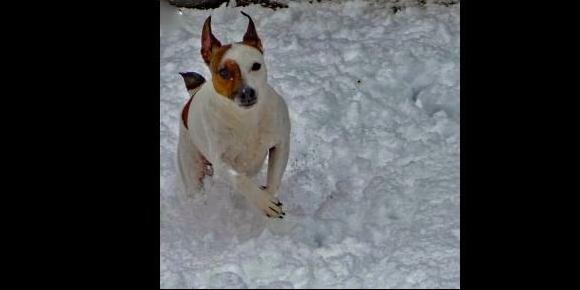Keep Pets Safe and Warm This Winter with these Cold Weather Tips

- posted: Feb. 03, 2019
Cold Weather Hazards
Pennsylvania winters can be a mixed bag as far as temperatures and precipitation go, and while we are currently experiencing a bit of a warm up, we could be plunged back into a deep freeze any day. Here are some ways to protect your pets during the winter months.
- Ice melt and road salt: Protect pet’s paws with petroleum jelly, waxy protectants like Musher’s Secret or even boots when walking on roads or sidewalks that may be covered with salt or ice melt. These products can cause irritation to the pads and, if large amounts are ingested, may cause irritation in the mouth, stomach upset or even elevated sodium levels if enough is ingested. Store products where pets cannot get into them and use pet-safe products when possible. Wiping paws after a winter walk can also remove salt and other irritants.
- Antifreeze and De-Icing windshield products: The chemical ethylene glycol is found in most anti-freeze and some windshield de-ice solutions. This compound is sweet and can be deadly if ingested causing kidney failure. Make sure pets do not have access to antifreeze, clean up any spills immediately and consider using more pet-friendly products that contain the non-toxic propylene glycol instead.
- Limit time outdoors especially in below-freezing temperatures. If it is too cold for you to be outside for more than a few minutes, it is likely too cold for your dog or cat as well. Keep cats indoors during extreme cold weather if possible and do not leave dogs outdoors for more than a few minutes. Don’t clip coats too short during the winter months and consider a coat or sweater for small or short-coated dogs who may get chilled easily if they are going to be out longer than is needed to use the bathroom. Remove ice and snow from paws when pets come inside after playing in the snow. Dogs and cats can get hypothermia and frostbite—if skin on paws, ears or tails look pale or grey, gently warm with a dry towel and seek veterinary attention if you suspect frostbite.
- Bang on your car hood before starting the car. Cats and wildlife sometimes seek refuge under the hood of a car in cold weather and can be burned or cut with a fan belt if the car is started while the animal is on the engine block.
- Bathe pets less frequently in winter and use a humidifier in your home if possible, to combat dry skin. If your pet has some mild dander but is not itchy, no worries. But, if skin is red, your pet is losing patches of hair or if she seems extremely itchy, make an appointment with your vet. It may not be just dry skin. Cold weather allergies and skin infections while less common are still possible and proper medical care is needed to treat itch and infection.
We hope these tips help keep your pets warm and safe this winter!
This blog brought to you by the Patton Veterinary Hospital serving Red Lion, York and the surrounding communities.
Location
Patton Veterinary Hospital
425 E Broadway
Red Lion, PA 17356
